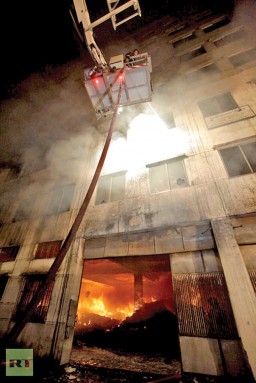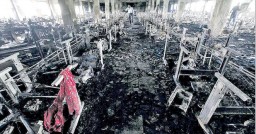
As sympathy pours in from around the world on the tragic fire that claimed more than 121 young lives at Tazreen Fashion a few weeks ago, focus is now shifting to what next. Apparently, the factory that was raised in the blaze had been making clothes for Walmart, Disney, Sears and other major global retailers, all of whom claim to be very socially responsible retailers/brands. Some of these brands have expressed surprise that their clothes were being made at the factory which had lost its fire safety certification in June and they thought they had stopped doing business with the place. The apparent confusion underscored what some industry experts say is a major obstacle to improving factory safety in developing nations.
Recurring fires in garment factories has been a matter of concern for years with more than 600 garment workers losing their lives in factory fires since 2006. Labour leaders are bracing for an escalation in Government and industry intimidation, seizing on the blaze – the deadliest in Bangladesh’s nearly 35-year history of exporting clothing – to argue that retailers must insist on more stringent fire standards. Shocked by the intensity of the incident global apparel buyers have suggested measures to avoid repetition of such incidents in future. At a meeting called by Bangladesh Garment Manufacturers and Exporters Association (BGMEA) to inform buyers about various steps taken to ensure fire safety at garment factories, buyers urged for strict implementation of compliance measures at work places.
Representatives of nearly 20 apparel sourcing companies, including H&M, TSS, Sears, Tchibo, Global Merchants, GAP Inc., Nike Inc., Levis, Kappahl and Carrefour who attended the meeting, recommended inclusion of an independent auditing company to specially oversee fire safety measures at clothing factories. The representatives also recommended setting up a taskforce, revision of building code as well as review of fire fighting facilities. They further suggested that the licenses of functional garment units be reviewed, while imparting more training to workers.

Laying special emphasis on the safety of the workers, the buyers said that owners of RMG units must review the progress of compliance from time to time. BGMEA assured the buyers that it would soon set up a taskforce to ensure fire safety at every garment manufacturing unit. The association has also promised to launch a training programme, especially dealing with fire safety at factories, for which it would segment the country’s apparel manufacturing areas into eight zones. BGMEA would also financially help the family members of those who perished in Tazreen factory blaze, for the next 10 years, the buyers were told.
Awareness for action has picked up over the years and in 2011, members of the Bangladesh-based Buyer’s Group created fire safety films to train factory management and workers on fire safety practices. The Buyer’s Group is represented by 19 international brands and retailers including Abercrombie & Fitch, Carrefour, Carter’s Inc., C&A, Gap Inc., H&M, JCPenney, KappAhl, KiK Textilien & Non-Food GmbH, Lindex, MQ,Phillips-Van Heusen, Target, Tchibo, Teddy/Terranova, Tesco, VF Corporation, Walmart and RnB Retails and Brand.
[bleft]Shocked by the intensity of the incident representatives of nearly 20 apparel sourcing companies have suggested measures to avoid repetition of such incidents in future during an emergency meeting called by BGMEA to inform buyers about various steps taken to ensure fire safety at garment factories[/bleft]
Only this year some commitments have come from retailers to help reform the garment industry in Bangladesh, with Phillips-Van Heusen pledging $ 1 million after a fire killed 29 workers in a supplier’s factory and GAP more proactively offering up more than $ 20 million to displaced workers and vendors upgrading their facilities. Following up on the initiative, PVH in March 2012 announced its participation in a groundbreaking fire and building safety initiative in Bangladesh, becoming the first brand to take stern action in this direction. The German retailer Tchibo also joined the initiative signing an agreement with unions and labour rights groups on factory safety in Bangladesh. The program, which will engage Bangladeshi workers directly in implementing health and safety standards in their factories, will also publicize factories that fail to correct major problems. This initiative is being seen as a major step forward for the Bangladeshi industry in preventing further tragedies.
Gap Inc. too has recently announced a significant initiative on its own to improve building and fire safety standards across the company’s approved third-party garment manufacturing factories in Bangladesh. Underscoring the tangible steps taken in the country over the last two years, including humanitarian aid, fire safety training and education, and fire safety audits, Gap Inc.’s program is a critical step forward to address fire and building safety issues in Bangladesh’s apparel industry.






